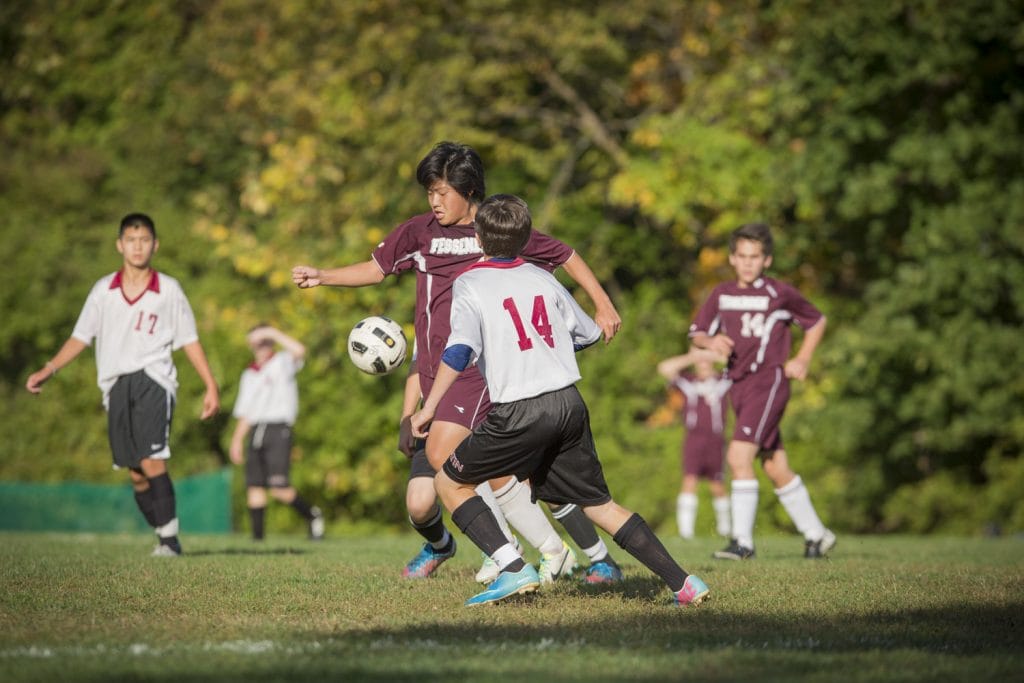Before delving into the intricacies of team sports vs. individual sports, it's crucial to understand that engaging in any form of sport is a boon to a child's physical and mental health. Studies show that physically active kids benefit from higher test scores, are less likely to become obese, are more likely to go to college, and often see higher earning potential as they grow into adulthood.
The Aspen Institute Sports & Society Program is just one of many organizations that not only tracks the benefits of regular physical activity at an early age but also helps promote healthy communities through sports. They share that “physical activity in general is associated with improved academic achievement, including grades and standardized test scores. Further, such activity can affect attitudes and academic behavior, including enhanced concentration, attention, and improved classroom behavior.”
At most private schools in MA, students are required to select and participate in one sport each season, and many programs offer a diverse range of options—including team and individual sports. But how do you choose? What option is best for your child’s personality, interests, and skill set? And is it better to play individual sports or team sports? Here are some things to consider if you are trying to decide which sport(s) to sign your child up for this school year.
Team Sports Offer a Clear Path to Leadership
Team sports offer players the opportunity to learn from coaches and teammates. As children grow and mature, they eventually become ready to assume leadership roles themselves. There are generally no captains in individual sports, but in team sports, there are several leadership opportunities.

Team captains are, of course, considered to be leaders among their peers, and even if an athlete doesn’t hold a specific title, many players become “unsung heroes.” They lead by example, work hard to be the first ones on the field and the last ones off, and address any behaviors from teammates that might be detrimental to the overall success of the team. It is a tall order for young athletes to take on, but the opportunity for growth is significant
Team Sports Teach the Value of Teamwork
The success of the team is dependent on each member executing the responsibilities that are required of them.
Consider a successful field goal in football. The snapper must deliver the ball accurately and in a timely manner to the holder, who in turn must handle the ball and place it on the ground in the appropriate spot (with laces out!), and finally, the kicker must time his approach so that their kicking leg arrives just after the ball has been placed.
This is quite a lot of teamwork that goes into three simple—but often game-changing—points. This type of teamwork teaches young players to see themselves as individual parts of a greater whole and to handle and embrace the pressure that comes along with being a member of a team.
Available Team Sports at The Fessenden School
Team sports vary by season and school offerings. Team sports at our private school in MA include:
Fall- Football (Flag and Tackle)
- Soccer
- Basketball
- Hockey (Competitive & Recreational)
- Crew
- Baseball
- Lacrosse
Individual Sports Spark Individual Growth
While individual sports may not provide athletes with the same opportunities for community team-building and leadership opportunities, they do place a much greater emphasis on personal growth.

In a team sport, an individual player can share the burden (and the triumphs), but in an individual sport, the athlete bears the weight of success and failure alike on his or her shoulders. This teaches young athletes about self-reliance and requires them to build strategies to learn quickly from their mistakes and make corrections on the spot.
Consider the figure skater who stands alone on the ice, spotlights shining down while the crowd watches his or her every move. The skater is expected to perform a routine flawlessly in order to win, and there is no one to hide behind, to pass the ball to, or with whom to share the burden of competition. Thus, individual sports are helpful to build discipline, mental strength, and a high level of ownership.
Types of Individual Sports at Fessenden
Individual sports vary by season and school availability. The individual sports offered at Fessenden include:
Fall- Cross country
- Golf
- Mountain biking
- Tennis
- Weight training and conditioning
- Cross-country skiing
- Squash
- Wrestling
- Weight training and conditioning
- Golf
- Mountain biking
- Tennis
- Track and field
- Weight training and conditioning
Team Sports and Individual Sports at Fessenden
From recreational squads to competitive, championship-winning teams, Fessenden’s Athletics Program offers something for every boy. Fessenden boasts 21 team and individual sports at the interscholastic, intramural, and recreational levels in the fall, winter, and spring—more than 30 teams in total.
By removing a “win-at-all-costs” mentality, our coaches focus on sportsmanship as well as skill development. And it works: our varsity teams compete at the highest levels and have won numerous New England Junior Prep Championships.
So, how do you help your child choose the sport that is right for them? Both team sports and individual sports carry the benefits of exercise, agility, and competition. And, to varying degrees, they both instill values of discipline and grit.
A young athlete has a lot to gain from both options and perhaps the best choice is to provide them with opportunities to play both and determine which path brings them the most joy. If your child wants to play soccer in the fall, perhaps you can sign him or her up for recreational skiing or strength training and conditioning in the winter.
Read On

Why are Sports Mandatory at Most Junior Boarding Schools?

6 Fun Weekend Activities at Our Massachusetts Junior Boarding School

